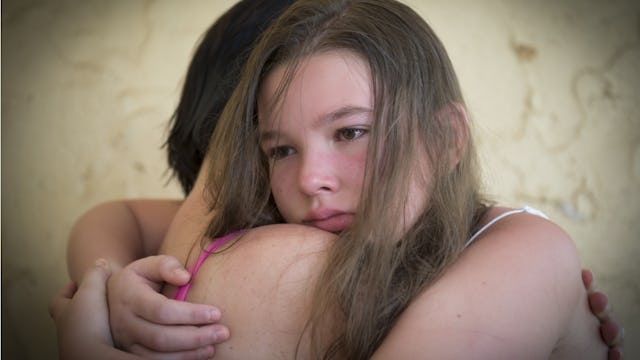Kids Need A Safe Place To Express Their Feelings. Be That Space For Them.

Sometimes my kids will come home from school (or anywhere where they’ve been without me) and immediately start to act like total jerks. They’ll throw their stuff on the floor in one messy heap and collapse on the couch whining for snacks, water, and just…whining. For what feels like an eternity.
It can get on my very last nerve, especially when they are both acting this way at the same time. It feels like their foul moods will drive their dad and me to the brink. But eventually, after blowing off steam, getting a snack, and maybe telling me about something that ticked them off during the day, they’ll settle down and reassume their normal, mostly happy-go-lucky personalities.
No, they aren’t bratty, awful kids. And it’s not just because they are tired. Nothing particularly devastating has to happen that day to set them off. It’s just that they are home — they are with me — and this is their safe space to be themselves, let out their feelings, and feel heard.
It is not easy being a kid. It is normal for kids to have emotions that feel much bigger than they are, to feel them day in and day out and not really know how to process them. You may have heard that the part of a child’s brain that rationally regulates emotions doesn’t fully mature till they are in their 20s (yes, really!).
But we tend to forget that, don’t we? We often expect kids to be able to handle those big feelings when they are young, without much help, and without so much as a peep. That’s not feasible. Or healthy.
I have been blessed with kids who pretty much have learned to “keep it together” in social settings, including school. But whether or not your child is able to behave outside of the home all of the time, the fact is, it’s something we generally expect of our kids. And many kids are out and about for lots of hours each day, whether it’s at school or child care or various activities, and regulating their emotions for that long is a lot.
It’s no wonder kids need a safe place to let out some of their angst.
The thing is, sometimes kid emotions can be really explosive and take even the most calm and flexible parents by surprise. If you are your child’s safe place — the place where they can comfortably let those difficult feelings out — it’s hard not to take their outbursts personally. It’s hard not to feel like they are aiming their intense emotions directly at you.
Of course, if your child is, in fact, acting violently in any way, you’ve got to set a firm boundary with them. I have a low tolerance for too much noise as well, though I realize my kids just need to scream their heads off sometimes to blow off steam (don’t we all?).
Being your child’s “safe space” can look messy. You might feel like you’re the only one who has a kid with such strong emotions (trust me: you aren’t). You might feel like you’ve done something wrong as a parent to have created this volatile little being (you haven’t).
Kid emotions really are that irrational, strong, and difficult sometimes. But their emotions are not the problem. The problem comes when parents consistently shut those emotions down. When parents scold their children for the natural and necessary need to express their emotions in a safe and nurturing place. When parents send the message to their children that there is no safe place for them to express these dark feelings.
The problem comes when parents shame their kids for these feelings.
You may be familiar with what happens when children are repeatedly knocked down and shamed this way. The emotions don’t go away. They get suppressed and come out in unnatural, warped, often unhealthy ways. This is where mental health disorders like anxiety and depression are born (or exacerbated if a child is already born with such tendencies). This is where addiction and violent behavior often has its origins.
Trust me: This is not what you want for your children.
You may not always like how it feels to have a child who unloads their stuff on you on a regular basis. If you ever feel like it’s too much, please don’t expect to do it alone. Seek counseling for yourself, or your child, if necessary (there is absolutely no shame in that) and make sure to discuss any concerns with their pediatrician.
Please know that nurturing your child’s mental health is perhaps the most important thing you can do for them. Teaching your child that all emotions are okay — and absolutely nothing to be ashamed of — is the greatest gift you can give to your child, and one that will last them a lifetime. The process can be exhausting, but it’s so worth it.
This article was originally published on